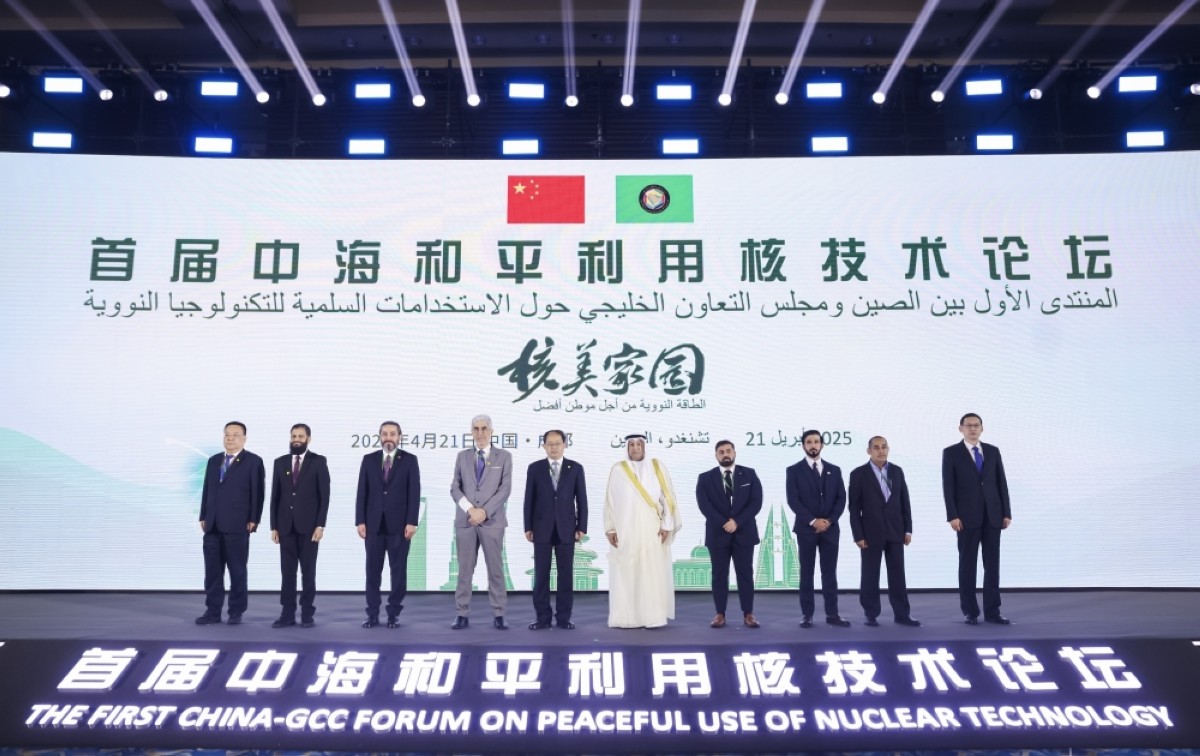CHENGDU: Kuwait has reiterated its firm support for the right of all nations to develop and utilize nuclear energy for peaceful purposes, in accordance with the Treaty on the Non-Proliferation of Nuclear Weapons (NPT). The reaffirmation came during remarks delivered by Abdulaziz Al-Dakhil, Counselor at the Kuwaiti Embassy in China, at the opening session of the First China-Gulf Forum on the Peaceful Uses of Nuclear Technologies held Monday in Chengdu, the capital of China’s Sichuan Province.
Al-Dakhil emphasized Kuwait’s unwavering commitment to promoting a nuclear-weapon-free zone, while highlighting the country’s active cooperation with the International Atomic Energy Agency (IAEA). He noted that such collaboration enables Kuwait to effectively harness nuclear technologies to support national development plans, enhance economic growth, and improve societal welfare.
The Counselor pointed to Kuwait’s growing partnership with the IAEA, particularly through technical cooperation initiatives. He revealed that Kuwait has submitted four national projects in the fields of genetically modified crop production, groundwater management, radiation-based cancer treatment, and the mitigation of environmental and radioactive pollution.
Counselor at the Kuwait Embassy in China, Abdulaziz Al-Dakhil
In addition, Al-Dakhil said Kuwait is continuing to explore the use of nuclear technologies in the oil and energy sectors. He noted that the Kuwait Institute for Scientific Research (KISR) is currently conducting advanced studies, in collaboration with the IAEA, on the potential integration of small modular reactors (SMRs) into the country’s energy mix. These studies assess the technical, economic, environmental, social, and political dimensions of adopting peaceful nuclear energy.
While Kuwait has not yet launched a national nuclear energy program for electricity generation, Al-Dakhil clarified that the ongoing assessments are aligned with the country’s long-term energy vision and global advancements in nuclear technology. He expressed hope that the inaugural forum would generate actionable recommendations to strengthen joint cooperation and further strategic interests between Gulf countries and China. Al-Dakhil also underscored Kuwait’s belief in the importance of high-level dialogue and coordination in the peaceful application of nuclear technologies.
The First China-Gulf Forum on the Peaceful Uses of Nuclear Technologies brought together senior officials and experts from the Gulf Cooperation Council (GCC), including GCC Secretary-General Jasem Al-Budaiwi and Director-General of the China National Atomic Energy Authority (CNEA) Shan Zhongde. Representatives from the IAEA, research institutions, and nuclear energy specialists from across the globe also attended the high-level event.
The forum aimed to promote political dialogue, foster knowledge exchange, and deepen long-term strategic partnerships between China and GCC states in the field of peaceful nuclear energy. Key topics of discussion included energy transition, technological advancement, and addressing regional and global energy challenges.
Speaking to China Central Television (CCTV), Al-Budaiwi praised China’s expertise in clean energy and its leadership in nuclear safety. He said the forum would serve as a vital platform to enhance Sino-Gulf collaboration and contribute to regional prosperity through sustainable energy solutions. For his part, Shan Zhongde reaffirmed China’s commitment to international cooperation in the nuclear sector, expressing readiness to share experience and build a global community rooted in peaceful development and mutual benefit.
On the sidelines of the forum, the CNEA and Saudi Arabia’s Nuclear and Radiological Regulatory Commission signed a memorandum of understanding (MoU) to boost cooperation in nuclear safety. The agreement outlines joint efforts in nuclear security, non-proliferation, and emergency preparedness through technical exchange, training programs, and collaborative frameworks. The forum underscores the growing momentum in China-GCC cooperation as both sides work to position nuclear energy as a pillar of sustainable development and regional energy security. — KUNA


















